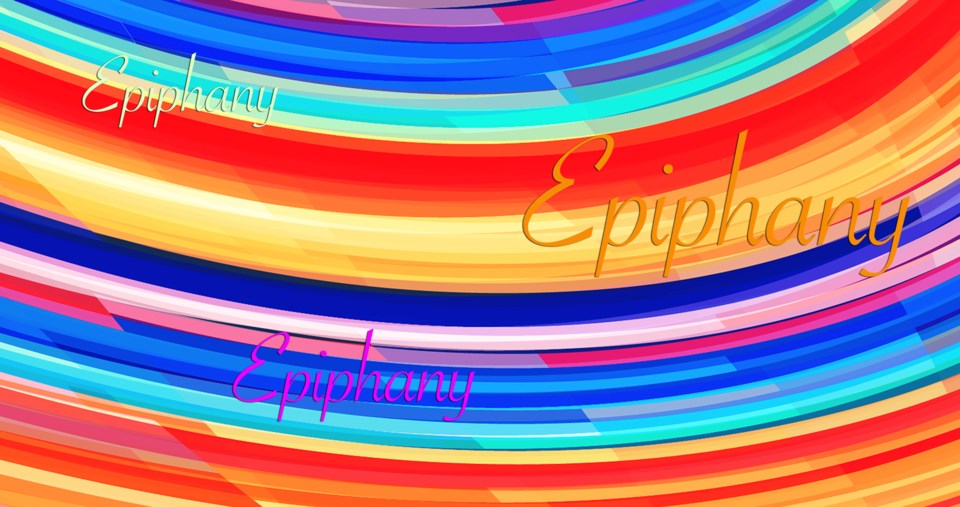Two Mondays ago was Epiphany. Well, in the tradition of the Western Church, it was Epiphany. For the Eastern Church, it was Christmas Eve.
Never mind, though. In either tradition it was a day of revelation and recognition and illumination.
To consider the story in Matthew’s gospel, it certainly was a day of recognition and epiphany for Mary! There she was, at home with her young son, Jesus, when, completely unannounced, sages from the East arrived on her doorstep. They entered her house, knelt down before her little boy, and offered him gifts of gold, and frankincense, and myrrh. For Mary, Jesus’ mom, I can’t help but think this moment was a moment of heart-stopping realization, and recognition, and epiphany.
Can you just imagine?
But I think, sometimes, we inadvertently reduce the consequence and import of the story to solely one of recognition. Like the baptism of Jesus in the River Jordan, and turning water into wine at a Cana wedding, we assign the meaning of the stories to epiphany alone. Or we assign alternative priority.
It seems to me, the story of the Magi is often used as precedent and warrant for giving gifts at Christmas. The idea is expressed in numerous Christian hymns that give us verses like:
What can I give him, poor as I am?
If I were a shepherd, I would bring a lamb;
If I were a wise one, I would do my part;
Yet what I can I give him - give my heart.
The epiphany, the revelation that (I worry) is so often missed, or subordinated, is the eternal, gracious, sacred, loving assurance that it is not about our gift to God; rather, it is all about the gift of God to us!
And that gift of God to us is God’s Son, this boy child Jesus, who grows in wisdom and in stature, to become the young man we know as Saviour and Messiah, as Christ and Friend. And with this Christ, and in this Christ, epiphanies, engaging and restoring us, are the wondrous gift and legacy to us that Christ gives us every day. As all God’s children, we are called to recognize and see them, to live them fully, and find life.
Recently, there was a funeral held in Thorold for a young man who had been resident in a group home in St. Catharines. The locals would have known him as a quiet man who would approach from time-to-time, asking for some change or for a cigarette - totally unthreatening and benign. To his housemates at the group home, he was so much more. And at Epiphany, we can realize how much more.
In his reflection, the minister at the service was guided by a parable he’d read about Joseph and his coat of many colours. There were eight colours in the coat and, to every colour, the parable assigned an event in Joseph’s life. Brown, for example, was the colour of the sheaves of wheat in Joseph’s first dream; black, the colour inside the pit into which his brothers threw him; red, the goat’s blood that marked the coat then shown to Joseph’s father. The minister translated the idea of the coat of many colours to the young man whose life was being honoured, and assigned a stage in his young life to every colour.
This is what he said:
- Brown - The peanut butter that he loved, and the ready coffee
- Yellow - Walks along the pathways of the nearby park and on St. Paul Street
- Green - The scratch tickets he loved to do
- White - A housemate running out to greet him with a cigarette as a welcome home from hospital
- Black - The tough times and the pain he was helped through by both his family of birth and his group home family
- Silver - Scoring smokes or cash or a Tim Horton's card, or giving smokes away
- Red - McDonald’s containers holding the fries he loved to eat with his favourite Big Mac and vanilla shake
- Purple - The day (as his housemates put it) he became an angel and got his golden wings
All these colours, said the minister, constituted the fullness of the coat that spoke of this young man’s life, and he said this coat was sacred.
Our epiphany that day, the revelation to us was: that the life of this young man had been a gift. Never again would we be able to dismiss someone asking us for money as a nuisance. From that point on, we knew that we would always see someone who might approach us to ask for money, or a cigarette, or kindness, as someone’s son, or uncle, or brother, or beloved housemate; whose life was valued, and his own; whose life had made a difference and had a lesson and an insight, and a gift to give.
It was a revelation; it was epiphany; it was the gift of Christ, again and again, each day; the gift of the One who is the very gift of God, and who says to us, and beckons, “Follow me.” This is the wonder and epiphany of life in all its fullness, and we say thank you.



